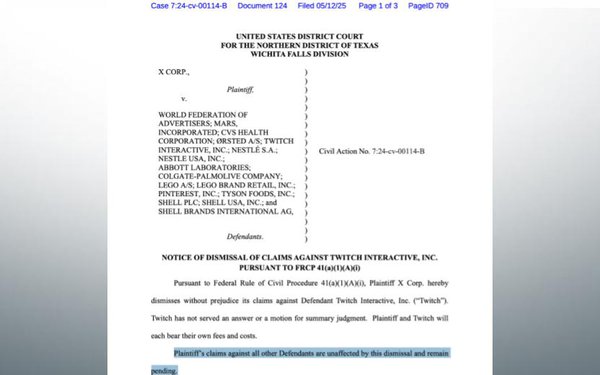
Elon Musk's X Corp. has withdrawn its ad-boycott
lawsuit against Amazon's Twitch, according to court papers filed Monday with U.S. District Court Judge Jane Boyle in Wichita Falls, Texas.
The move was without prejudice, meaning that X Corp.
could bring its complaint again in the future.
The withdrawal comes around four weeks after Boyle rejected a deal that would have paused the dispute until January 2026. That deal would have
required Twitch to meet certain unnamed conditions by the end of the year.
Boyle refused to stay proceedings, saying in a written order that it would be “inefficient” to keep the
matter on her docket for nine months after the parties reached a settlement.
The withdrawal notice, filed Monday, does not indicate why Musk withdrew the case -- or what conditions, if any,
Twitch has promised to meet.
advertisement
advertisement
The legal battle between Musk and Twitch began in November, when X Corp. added Twitch as a defendant to a lawsuit alleging that the World Federation of Advertisers and its now defunct brand
safety initiative, Global Alliance for Responsible Media (GARM), sparked a “massive advertiser boycott” that cost the company billions in ad revenue.
Other defendants include
Ørsted, Mars, CVS, Abbott, Colgate, Lego, Nestle, Pinterest, Shell, and Tyson. The proceedings against them are continuing, and they are expected to file court papers today.
World
Federation of Advertisers shut down GARM in August, days after the suit was
filed.
Musk brought the complaint shortly after the Republican-led House Judiciary Committee issued a report accusing GARM of coordinating action by corporations, ad
agencies and other industry groups in order to “demonetize platforms, podcasts, news outlets, and other content deemed disfavored by GARM and its members.”
The House staff report
alleged that GARM colluded with others to cut ad revenue to X after Musk purchased it in October 2022.
A spokesperson for the now-shuttered GARM said at the time that the organization
"enhances transparency in previously opaque practices relative to ad placements in digital social media."
“GARM creates voluntary industry standards on brand safety and suitability which
media sellers and ad tech companies can voluntarily adopt, adapt or reject," the spokesperson said in July.